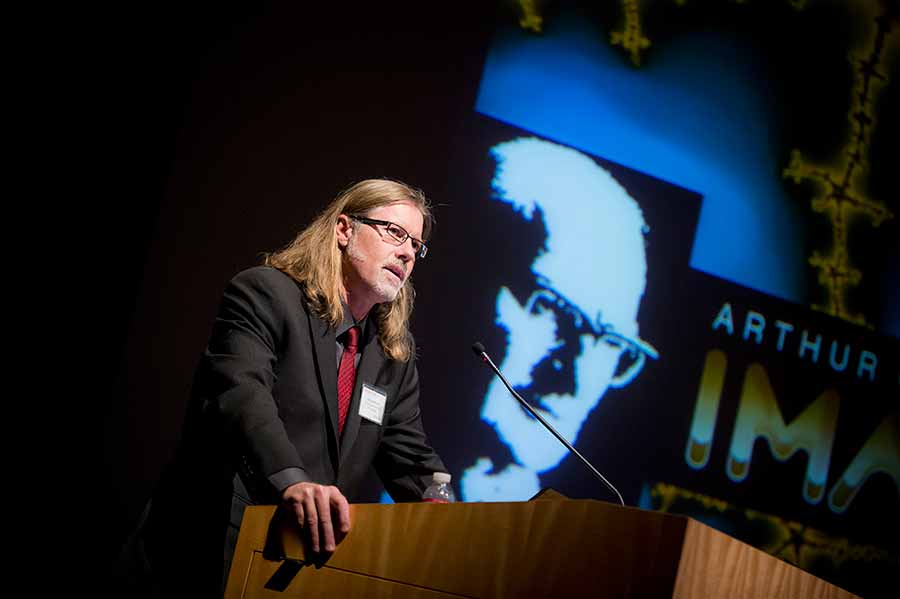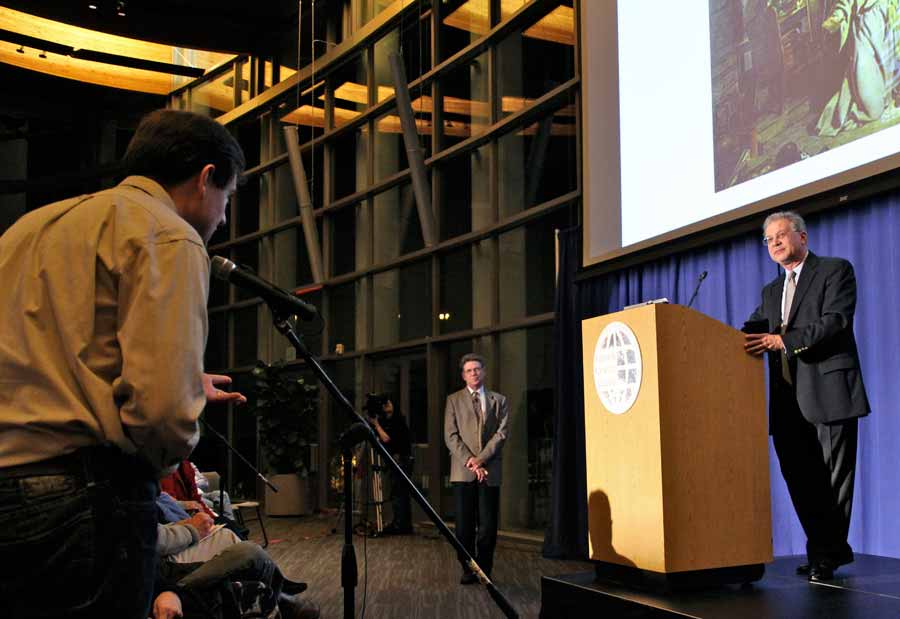UC San Diego Division of Arts and Humanities Hosts Lectures on Health and Well-being
Published Date
By:
- Cynthia Dillon
Share This:
Article Content
The University of California, San Diego Division of Arts and Humanities hosts, “Degrees of Health and Well-being,” a public lecture series that runs from January 20 through February 24, 7:00 p.m., in the Great Hall, where six keynote speakers will present talks to campus and wider San Diego audiences.

Sheldon Brown, director of the Arthur C. Clarke Center for Human Imagination and Department of Visual Arts professor, presents during the 2014 lecture series, “Degrees of Freedom.”
Established under Eleanor Roosevelt College in 2012, the popular lecture series with a focus on multidisciplinary topics is now supported by the arts and humanities division. The lecture series’ creators include Steven Cassedy, a literature professor in the Division of Arts and Humanities and Alan Houston, a political science professor in the Division of Social Sciences.
“Under Dean Cristina Della Coletta the vision for the series is to reach across all campus disciplines and address a key university theme, ‘Understanding Cultures and Addressing Disparities in Society,’” explained Cassedy.
With a purpose to engage members of the community with the research and education mission of UC San Diego through its finest scholars, artists and teachers, the upcoming lectures feature an impressive line-up of speakers:
- Larry Smarr, Ph.D., M.S., founding director of the California Institute of Telecommunications and Information Technology (CALIT2), who will present, “Know Thyself: Quantifying Your Human Body and its One Hundred Trillion Microbes,” Jan. 20;
- Natalia Molina, Ph.D., professor of history and urban studies, Academic Senate Distinguished Teacher and associate vice chancellor for faculty diversity and equity, who will present, “How Scientific Racialization Shapes Mexican Immigration Policies, 1848-present,” Jan. 27;
- Steffanie Strathdee, Ph.D., associate dean of global health sciences, Harold Simon Professor and chief of the Division of Global Public Health in the Department of Medicine at the UC San Diego School of Medicine, and adjunct faculty at John Hopkins University, presents, “Postcard from the Trenches: Tijuana’s Hidden Epidemics of HIV and Tuberculosis,” Feb. 3;
- Cheryl Anderson, Ph.D., M.P.H., M.S., associate professor in the Department of Family Medicine and Public Health at UC San Diego’s School of Medicine will present, “Dietary Intake and Disparities in Chronic Disease Risk: Examining the Problems and Accelerating Solutions,” Feb. 10;
- Tom Wong, Ph.D., assistant professor in the university’s Department of Political Science, who will present, “Expanding the American Electorate,” Feb. 17
- Veerabhadran (“Ram”) Ramanathan, Ph.D., Distinguished Professor of Atmospheric and Climate Sciences at the Scripps Institution of Oceanography, presents, “In Pursuit of the Common Good: A New Alliance between Science, Religion and Policy,” Feb. 24.
Additionally, Della Coletta wanted to offer students an increased opportunity to participate. Consequently, the winter 2016 audiences will view and vote on student projects related to the lecture series’ theme. From the three categories of participants—Preuss School UCSD high-school juniors and seniors, and UC San Diego undergraduates and graduate students—first-, second- and third-place winners will be recognized.

Professor Seth Lerer, Department of Literature, takes a question from an audience member during 2012’s “What it Means to be Human,” theme. Professor Steven Cassedy (left center) looks on.
“We consider the arts and humanities the foundational center, the intellectual core, of any and all disciplinary endeavors,” explained Della Coletta. “These lecture series demonstrate that field-specific technical knowledge needs to be translatable to diverse audiences to be fully operational and valuable.”
Cassedy and Houston explained that the audience experience is driven by access to some of UC San Diego’s most exciting researchers and instructors who address some of the most pressing issues of our time.
“We’ve offered the series for the past four years to showcase faculty who have something important to share with the world outside academia,” said Cassedy, adding that audiences of educated, non-specialists add to the series’ success each year.
Cassedy acknowledged that he and Houston enjoy watching their colleagues engage in a setting outside the traditional classroom or lecture hall, watching the audience react to each speaker, and watching the speakers field questions from audience members.
Since its inception, the lecture series has focused on themes which have included talks about what the “good life” means, what it means “to be human,” and last year’s topic of “freedom.” Past speakers have varied from anthropologists, physicists and neuroscientists to musicians, visual artists and biblical scholars. Attendance for the lectures has ranged between 200 and 300 participants.
This year, the division’s campus partners include the Office of the Executive Vice-Chancellor, Division of Social Sciences, Eleanor Roosevelt College, Scripps Institution of Oceanography, UC San Diego Graduate Division, the Qualcomm Institute and UCSD TV.
For more information, please visit the Division of Arts and Humanities website.
Share This:
Stay in the Know
Keep up with all the latest from UC San Diego. Subscribe to the newsletter today.



